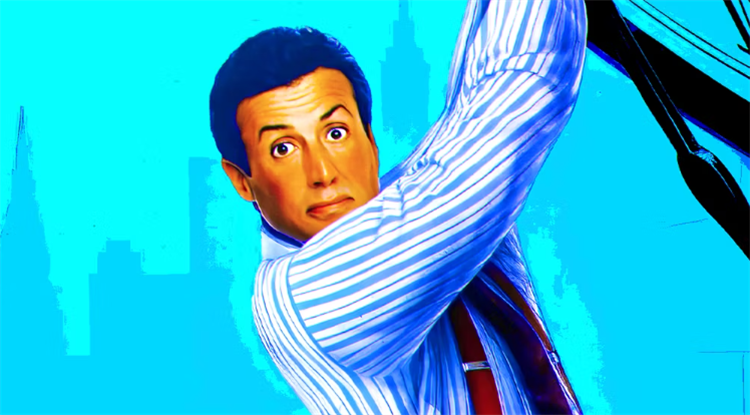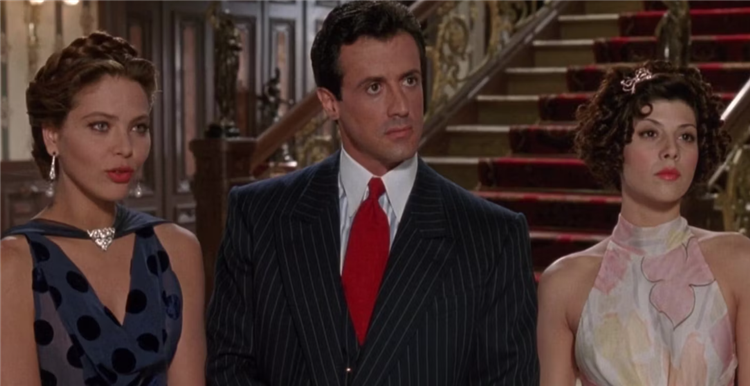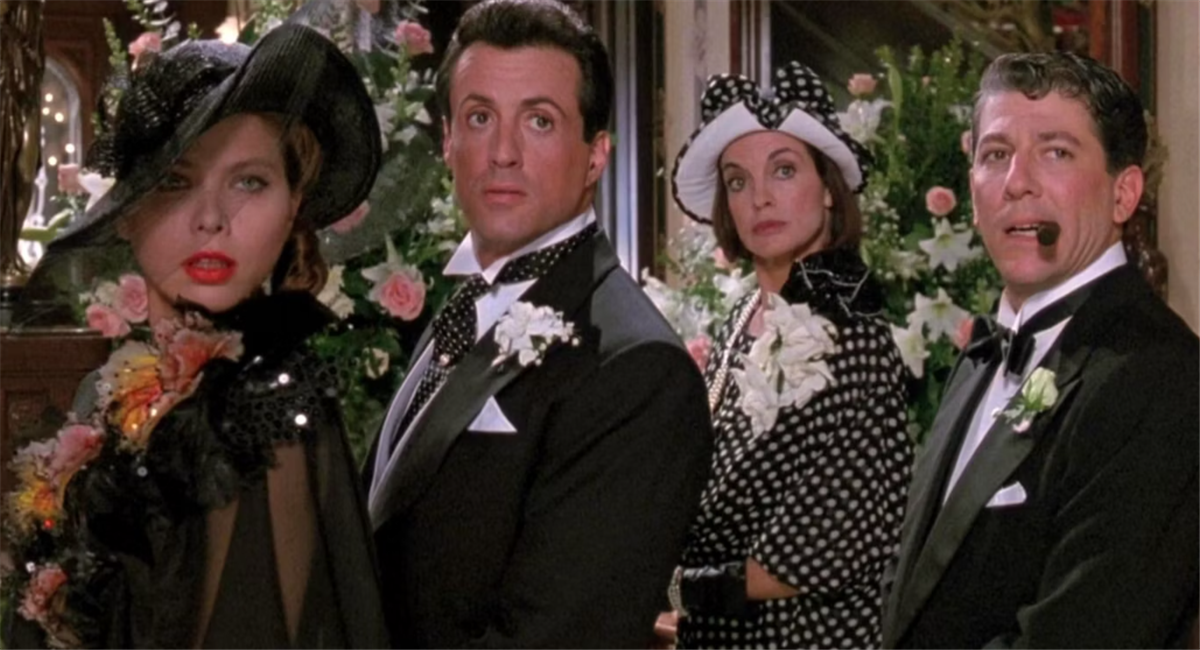Hollywood is rife with breakouts, virtuosos, typecasts, and, unfortunately, miscasting — which is why you’ll rarely see an actor like Harrison Ford play a villain or Michael Wincott play the good guy. Diversity is key, however, so we often see actors taking chances on roles that may or may not fit them. Not every action star is cut out for comedy, and not every comedic actor is meant to do action, but it does happen quite frequently. When Die Hard changed the action genre in the late ’80s, many of its meatier stalwarts took the cue to expand their repertoire, adding more comedy to their offerings. One of the more deft performances in this series of noble experiments is Sylvester Stallone’s turn as Angelo “Snaps” Provolone in the 1991 comedy crime caper Oscar.
Helmed by John Landis and sporting a stellar supporting cast, Oscar is a period romp through Depression-era New York City, filmed to mirror the screwball comedies of the time. Based on the stage play by Claude Magnier from 1967, it is a comedy of errors featuring multiple mistaken identities, switched props, misunderstandings, white lies, secrets, and the lost art of elocution. While initially a maligned box office failure, many have come to the conclusion several years later that Oscar works surprisingly well as an ensemble comedy, and a great deal of its success could be attributed to Stallone’s admirable lead performance as Snaps.
The Winding Comedic Tapestry of ‘Oscar’

The overall tone of Oscar is confusion and misunderstanding. To summarize its many twists and turns would be both overwhelming and unwise — it is a film that one must see to truly understand. In a nutshell, Oscar is the story of Angelo “Snaps” Provolone, a bootlegger and gangster who swears to his dying father that he’ll go legit. On the day that he plans to make good on that promise by meeting some bankers and offering a large deposit for a seat on the board, everything that seemingly can go wrong, does go wrong. His accountant admits he’s been embezzling money from him, his daughter demands her independent agency, his maid unceremoniously quits, his “associates” can’t seem to put their old ways behind them, he’s being watched by the cops and a rival gang, his replacement maid is an old flame, and he can’t even seem to get through the suit-fitting he’s arranged for the big day from the finest tailors in the city. If that seems like a lot, it gets even more confusing as all of these characters continually swirl around the besieged Snaps in a tragic tornado of entrances and exits and switching props.
Oscar is a masterclass of the screwball comedy, and makes use of its supporting cast with gleeful self-confidence. Marisa Tomei stars as Snaps’ daughter Lisa, her first major role (unless you want to account for The Toxic Avenger) before winning an Oscar (pun intended) for My Cousin Vinny the following year. Tim Curry stars as the elocution instructor Dr. Thornton Poole, Chazz Palminteri is dim-witted goon Connie, Harry Shearer as half of the Finucci Brothers, Kurtwood Smith as Police Lieutenant Toomey, Kirk Douglas as Eduardo Provolone, and Peter Riegert is flawless as Snaps’ top man Aldo. It’s a lot to keep track of, but that’s part of the fun. For those uninitiated with the screwball genre, think Lock, Stock, and Two Smoking Barrels or Snatch with far less profanity, violence, or Cockney accents.
In keeping with the stage play’s central premise, the entire film takes place within Provolone’s home, with only occasional glances outside, typically from the vantage point of the snooping police or rival gang. Keeping the action set in the garden, the foyer, the sitting room, and Lisa’s room allows the claustrophobia of the rapidly expanding powderkeg to set the stage for excitement as the pressure builds.
But Is Sylvester Stallone Actually Funny in ‘Oscar’?

An ensemble comedy cast is only as strong as its weakest link, so Stallone has a Herculean task on his hands anchoring Oscar. Comedy is timing, physicality, relatability, and believability, and Stallone nails all of these prerequisites. He starts the film confidently, conducting his men with a mere snap of his fingers (hence his nickname). He displays his humility quickly, within the first three minutes of the film, allowing himself to be slapped across the face several times by Eduardo Provolone (Douglas). At the close of the sequence, Stallone deadpans into the camera, inviting the viewer into his crucible. When the film lurches forward, he still has an authoritative gait to his walk, but his demeanor has softened — he seems resigned to make his papa proud and has found a peace in this.
Stallone is quick, punchy, and confident. He seems to understand not only the character of Snaps and his limitations, as well as what he needs to overcome, but also the role that he plays in communicating the story. He makes a Rocky reference at Jack Dempsey’s expense, and the elocution lesson scenes actually highlight Stallone’s shortcomings as an erudite thespian. He allows himself to be part of the joke — he plays the role of the Standardized Leader of the ensemble, and essentially finds himself reacting to the story and its madcap beats as a stand-in for the audience. To maintain sanity within the asylum is the feat. He’s not twisting his face and screaming at children like Arnold Schwarzenegger in Kindergarten Cop, he’s trying to maintain his cool. As the third act ramps up its frenzy, and understandings begin to dawn, Stallone offers up some excellent reactionary comedy.
Oscar serves to remind viewers that Stallone is not just his muscles, and never has been. He’s the man that brought us The Expendables, the farcical deconstruction of ’80s action excess. He’s a master storyteller, as evidenced by his work as a screenwriter on the Rocky films, and he’s a dedicated dramatic performer. First Blood was a drama, you may recall, and it wasn’t until the Hollywood Hit Factory got its mitts in the sequels that he was constantly tearing his shirt off and killing baddies like an Italian Hulk. Stallone knows his way around a film, on all sides, so it shouldn’t have surprised audiences that he wanted to headline a screwball comedy, if for no other reason than to challenge himself. He would go on to make more comedies to varying degrees of success. For every Stop, or My Mom Will Shoot! there’s a Demolition Man, and cinematic history is better for it. If it’s been 30 years since you’ve watched Oscar, you deserve to give it another chance and glimpse Stallone at his comedic best.
